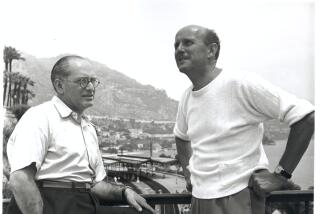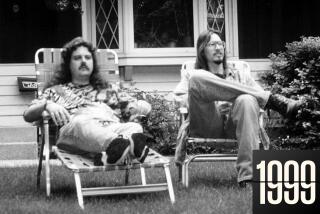Powell’s ‘Peeping Tom’ Still a Scary Look at Fear
- Share via
Nearly four decades old, Michael Powell’s genuinely spooky “Peeping Tom” still ranks as one of the most terribly strange and twisted of motion pictures. Even in a day and age when the outre is encouraged, this brilliant dark gem stands out in a crowd.
Playing for a week at the Nuart in West Los Angeles, “Peeping Tom” is more than a sympathetic portrait of a deviant personality. Made in 1960 in England, it’s been cited by director and film buff Martin Scorsese as (along with Fellini’s “8 1/2”) one of the two pictures from which “you can discover everything about the people who make movies.”
Until he directed “Peeping Tom” (which is being shown in a gorgeous new 35-millimeter print), Powell was known as a consummate pictorialist whose films (often made in collaboration with Emeric Pressburger and including “The Red Shoes,” “Black Narcissus” and “A Matter of Life and Death/Stairway to Heaven”) were not known for outraging too many sensibilities.
But when “Peeping Tom” came out, all that changed. The reviews it received were merciless and scathing (Powell reprints generous chunks of them in his autobiography, “Million Dollar Movie”) and though the director was considered one of the great names of British film, his career was abruptly ended by the notoriety.
What is clearer today than in 1960 is “Peeping Tom’s” probing and iconoclastic nature, the way its overriding aim was not to horrify but to provoke thought. In part about scopophilia, “the morbid urge to gaze,” more commonly known as voyeurism, “Peeping Tom” is more than the history of a personal obsession. It’s quite consciously about the movie-making and moviegoing experience that functions as a cautionary tale for the film addict in all of us.
“Peeping Tom’s” action begins with an unseen man stalking a Soho prostitute. Though she doesn’t know it, we observe the man also filming her with a movie camera hidden in his overcoat sleeve. He records the inevitable murder on film in a way that not only terrifies the woman even more than approaching death, but also quite frankly sexually excites the killer when he watches the resulting footage on elaborate home projection equipment.
“Peeping Tom” is no whodunit; the murderer is revealed almost at once to be Mark Lewis (Carl Boehm), a clean-cut, polite but distant young man who mystifies almost everyone he comes across.
Mark has two jobs, working on a camera crew at a British movie studio and as a photographer who specializes in shooting for magazines with “girls on the front covers and no front covers on the girls.” Shy and furtive, he has no friends to speak of, and his most intimate relationship is clearly with his Bell & Howell camera.
Chance throws Mark together with a beautiful young neighbor named Helen Stephens (Anna Massey in her film debut). It’s to her that he tells his astonishing story. His father was A.N. Lewis, a celebrated scientist and the author of the multivolume “Fear and the Nervous System.” To get his results, he experimented on his son, waking young Mark up in the middle of the night, completely terrifying him and then filming what transpired.
Unnerving though its subject is, “Peeping Tom” is never explicitly violent and, by today’s standards, is almost reserved in what it puts on the screen. In fact, the most disturbing images we see are the home movies of the senior Lewis (played, in a pointed bit of casting, by Powell himself) genteelly tormenting his son.
“Peeping Tom” follows Mark on his search for potential victims (“The Red Shoes’ ” Moira Shearer is especially good as a studio stand-in named Vivian) and also the London police as they try to determine why these women have the most awful look on their faces anyone’s ever seen. Fear, as it turns out, is the most frightening thing in the world, and “Peeping Tom” makes us feel it palpably as few films have been able to do.
Exclusively at the Nuart Theater, 11272 Santa Monica Blvd., West Los Angeles, (310) 478-6379, through April 1.
More to Read
Only good movies
Get the Indie Focus newsletter, Mark Olsen's weekly guide to the world of cinema.
You may occasionally receive promotional content from the Los Angeles Times.











